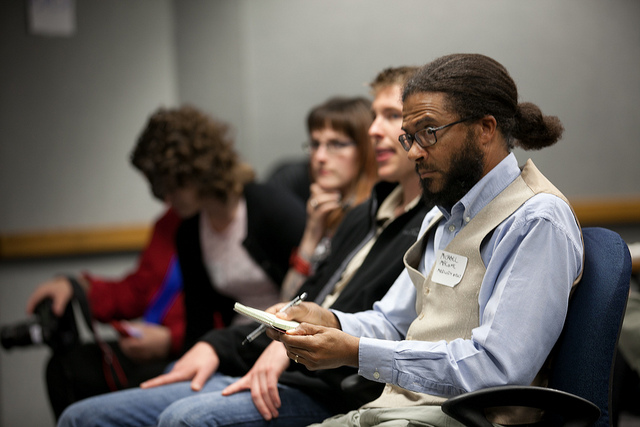A wave of student journalists descended on the capital this week, as Canadian University Press (CUP) convened its annual national conference in Ottawa.
Representing student papers from St. John’s to Nanaimo, these students work incredibly hard, on top of their academic obligations, to be a voice that engages with the student body, faculty, and community alike.
As a former CUP member and editor-in-chief of a campus newspaper, the conference has me reflecting on just how important my years with the Sputnik were, and why all students interested in writing of any kind should pick up a pen for their own student paper. Even Especially if you’re a journalism major.
1. Work on the merit of your own name

Emily Rose / Flickr
It’s tough to cold call sources, especially when it’s someone in a position of power and you’re a 20-year-old with no body of work to present. It becomes much easier to hide behind your professor, or your program, and fire off an e-mail reading, “Dear _______, I’m a second year journalism student taking an introduction to court reporting course with Professor _______, and I was hoping to interview you. The paper will only be used in class.” I get that. Sources might be gentler with you. They may agree because for the past 23 years, they’ve had a student from the exact same class with the exact same professor make the exact same request.
But being able to build the confidence to call and say that you’re reporting for a publication, and the end work will appear published in print with your byline beside it, instantly raises both your credibility and the respect you receive. It’s scary to leave the safety net of the university program, but it’s a necessary process to mature as a reporter and thicken your skin. You may (and likely will) end up with some bumps and bruises along the way when you stick your neck out like that, be it a broiling interview or an enraged letter to the editor, but it reveals more of the practical side of journalism that you may not get in a classroom. And it will benefit you down the road, whether you stay in the field or not.
2. Experiment
Writing for a course, whether it’s a journalism project or a sociology essay, is all about writing for a grade. In the work you put into it, you’re working to make sure all of the boxes are checked on the description or syllabus. Obviously, there are important skills to glean from this, but as you go through your university career, you tend to fall into a rhythm. All your papers start to look the same. You introduce materials and resources from past courses and re-use them. The light at the end of the tunnel is the grade circled in the top-right corner of your paper when it gets handed back.
When you’re writing for a campus paper, for an audience of more than one, the focus is on interest. You want the reader to be captivated by your words, both the story and the prose. You want to contribute to the overall performance of the paper by writing something gripping, informative, touching, or hilarious. Because of this, you can experiment. You can play around with your voice in a way you wouldn’t dare do on an essay. You can challenge yourself to write about a subject area you know little about. Best of all, with student newspapers in particular, you can get creative. Want to write a Thompson-inspired gonzo piece on homecoming? Chances are, you can do that. Write in as many different ways about as many different topics as you can, and develop your voice to write across different sectors for different audiences. That way, whether you’re interviewing for BuzzFeed or the Globe & Mail or Loulou you’ll have something to present.
3. Build a portfolio

Jon S / Flickr
So you’ve done some interviews with your municipal politicians and written a feature story that earned you an A+ in your third-year magazine writing course. Good for you. But when you apply for a job at your local daily, how are you going to present that? You can’t simply e-mail them the Word document with your teacher’s comments on it.
It’s the most simple, and the most repeated benefit, but it can’t be overstated: writing for your paper gives you clippings. That will serve you well down the line no matter what you do. For journalism majors who dream of that career, the reasons are obvious. But even if you’re in a different field, having a portfolio is a big help. In today’s media environment, where everyone is fighting for public attention all the time, being able to demonstrate to an employer that you have written, and been published, gives you a leg up. Perhaps you can become a point person for the latest blog post, or penning an op-ed piece for your company president.
4. Collaborate quickly
This one’s a double whammy. Working at a campus paper allows you to work both collaboratively in a team environment, while also working on tight deadlines. Sure, you may consider these some of the generic skills that get tossed in at the bottom of the resume, but they are important – and now you can prove that you have them. And as an added bonus, it’s fun. Sitting around, sharing some pizza, and tossing around ideas on how to tackle a certain subject, about what kind of art should accompany a piece, or what should lead that week’s paper is an enjoyable experience.
Learning the crucial time management skills of getting your story to an editor or getting an issue to print is also beneficial, and will serve you well in everything you do. Sure, your courses claim to do that. But there’s nothing quite like knowing if you don’t have a finished product in by production time, you’re out of luck.

Be prepared to become friends with coffee!
Flickr / Trophygeek
5. Networking
No matter how small your school is, the campus paper will always remain a home for the engaged and the critical, a space where great minds come together to discuss issues and ideas and tell stories. The people around you will help improve your skills and remain good sources well into your professional career. Whether you are with a newspaper that’s part of a larger organization like CUP or not, the people you work with will remain important, either as friends or contacts, for the rest of your life.
You also have the added benefit of meeting people you might not have ever had the chance, simply through the reporting process. Politicians, community leaders, business owners – any of these people could be great allies for you down the road, or even become good friends in the present.
6. More than just writing
Student journalism offers you the opportunity to do so much more than writing. It provides you a platform to get involved as you want to. Photograph some events. Take a video camera and record some streeters for YouTube. Copy edit. Participate in the production or design process. As the definition of journalist continues to change each day and more jobs look for “multimedia reporters”, it’s necessary to have the widest skill set possible.
7. Shout about your passions
For students in the arts and humanities, and even the social sciences, university education is all about critical thinking. With respect to the lecture halls that seat 300 students, there are few better places to put that into action than your campus paper. As the voice of the student body, you have the opportunity to investigate administrative issues and student union scandals, conducting original research and talking with the key players. If you write for a newspaper that puts an emphasis on community reporting, those options open up even more broadly.
Student news allows you to pursue and tell those stories most meaningful to you. That issue you’re passionate about, you can make your voice heard. It can be difficult to express that in a three hour lecture where only a few minutes is put aside for discussion. A campus paper gives you that outlet. You don’t have to hold back. Speak truth to power, and deliver the story so that others can chew on it.
8. It’s a blast
No, seriously. It’s just a whole a lot of fun.
Let me know your favourite memories from writing with your campus paper in the comments below!
Photo credit: JD Lasica







